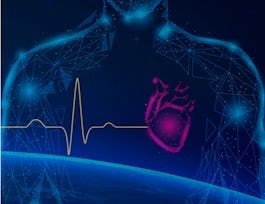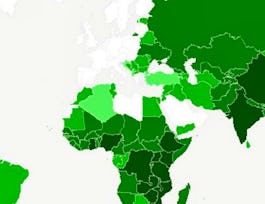This fifth and final course is centered on planetary health as a fundamental health determinant. As we consider how the health of humans is dependent on the health of Earth’s natural systems, we will also explore how to apply futures thinking and foresight principles to planetary health initiatives. The topics of this course include:



Social Determinants of Health: Planetary Health
Ce cours fait partie de Spécialisation Social Determinants of Health: Data to Action


Instructeurs : Daniel J. Pesut, Ph.D., RN, FAAN
Inclus avec 
Compétences que vous acquerrez
- Catégorie : Health Informatics
- Catégorie : Data Analysis
- Catégorie : Health Equity
- Catégorie : Planetary Health
- Catégorie : Data Visualization
Détails à connaître

Ajouter à votre profil LinkedIn
8 devoirs
Découvrez comment les employés des entreprises prestigieuses maîtrisent des compétences recherchées

Élaborez votre expertise du sujet
- Apprenez de nouveaux concepts auprès d'experts du secteur
- Acquérez une compréhension de base d'un sujet ou d'un outil
- Développez des compétences professionnelles avec des projets pratiques
- Obtenez un certificat professionnel partageable


Obtenez un certificat professionnel
Ajoutez cette qualification à votre profil LinkedIn ou à votre CV
Partagez-le sur les réseaux sociaux et dans votre évaluation de performance

Il y a 5 modules dans ce cours
The field of planetary health is based on the idea that the health of humans is dependent on the health of Earth’s natural systems. This module introduces the concept of planetary health and explains how it can be used as a framework for understanding other social determinants of health. The first lesson provides an overview of planetary health as a discipline, paradigm and movement. Lesson two explores the Indigenous origins of planetary health, and how the Great Acceleration has rapidly increased anthropogenic changes to the environment. Finally, in lesson three, we examine how planetary health addresses environmental determinants of health.
Inclus
4 vidéos6 lectures2 devoirs1 sujet de discussion1 plugin
Module 2 builds on what you learned in the previous module, as we take a more in depth look at planetary boundaries and the key data supporting our current understanding of planetary health. Climate change is not the only issue we are facing, and in lesson two, we investigate the broad range of environmental issues caused by humans and the resulting human health impacts of these disruptions. In lesson three, we take a look at the 12 cross-cutting principles of planetary health education which define the guiding themes and values of the emerging field. These principles provide a foundation for the growing interest and efforts in the field. We wrap up this module by looking at sources of planetary health knowledge, as we begin to reflect on how we can all take action in improving planetary health.
Inclus
5 vidéos4 lectures2 devoirs1 sujet de discussion1 plugin
In this module, we will explore movement building and emerging evidence-based planetary health solutions as we discuss how to combat the complex environmental issues covered in previous modules. Lesson one introduces the idea of The Great Transition, which will require innovation across fields and collaboration across social sectors to address planetary health concerns. We will also review organizations focused on evidence-based climate change solutions. In lesson two, we will analyze strategies for organizing an effective movement to enact widespread planetary health initiatives that will create change on a global scale. While the issue of planetary health can seem overwhelming, lesson three offers reasons to be hopeful for the future, as we consider the changes we can make in our own life to address planetary health issues.
Inclus
5 vidéos5 lectures2 devoirs1 sujet de discussion2 plugins
The purpose of this module is to introduce the concept of futures literacy and foresight leadership as people tackle the challenges of planetary health initiatives. People who want to bridge innovations across contexts must become time-conscious, future literate and embrace the dynamics of appreciation, influence and agency as they navigate change and transformation efforts. The development of futures literacy involves attention to the development and cultivation of futures thinking and foresight leadership. In part one, foresight is defined and several types of foresight leadership styles are described. In part two, strategies to develop foresight leadership are described and people are invited to apply futures thinking and foresight principles and practices to planetary health initiatives.
Inclus
2 vidéos4 lectures2 devoirs1 sujet de discussion2 plugins
This module will focus on analyzing, displaying and interpreting social determinants of health data, with a particular focus on predicting health outcomes based on various social determinants of health and environmental variables. Lesson one will provide an overview of regression analysis and scatter plot visualization. In lesson two, we will learn how to conduct regression analyses and create scatter plots in R. Using the NHANES dataset, we will predict general health status based on age, BIPOC, marital status, education, household size, income, insurance, BMI, depression, smoker, and drinks/day. Using the Omaha System dataset, we will predict final status score based on baseline status score, BIPOC, marstat and social determinant of health variables. Finally, we will discuss how to interpret the results of our analysis as we visualize our findings using line graphs and scatter plots.
Inclus
2 vidéos4 lectures1 évaluation par les pairs1 sujet de discussion1 laboratoire non noté2 plugins
Instructeurs


Offert par
Recommandé si vous êtes intéressé(e) par Health Informatics

Universiteit Leiden

University of Michigan

Duke University

The State University of New York
Pour quelles raisons les étudiants sur Coursera nous choisissent-ils pour leur carrière ?





Ouvrez de nouvelles portes avec Coursera Plus
Accès illimité à 10,000+ cours de niveau international, projets pratiques et programmes de certification prêts à l'emploi - tous inclus dans votre abonnement.
Faites progresser votre carrière avec un diplôme en ligne
Obtenez un diplôme auprès d’universités de renommée mondiale - 100 % en ligne
Rejoignez plus de 3 400 entreprises mondiales qui ont choisi Coursera pour les affaires
Améliorez les compétences de vos employés pour exceller dans l’économie numérique
Foire Aux Questions
Access to lectures and assignments depends on your type of enrollment. If you take a course in audit mode, you will be able to see most course materials for free. To access graded assignments and to earn a Certificate, you will need to purchase the Certificate experience, during or after your audit. If you don't see the audit option:
The course may not offer an audit option. You can try a Free Trial instead, or apply for Financial Aid.
The course may offer 'Full Course, No Certificate' instead. This option lets you see all course materials, submit required assessments, and get a final grade. This also means that you will not be able to purchase a Certificate experience.
When you enroll in the course, you get access to all of the courses in the Specialization, and you earn a certificate when you complete the work. Your electronic Certificate will be added to your Accomplishments page - from there, you can print your Certificate or add it to your LinkedIn profile. If you only want to read and view the course content, you can audit the course for free.
If you subscribed, you get a 7-day free trial during which you can cancel at no penalty. After that, we don’t give refunds, but you can cancel your subscription at any time. See our full refund policy.

